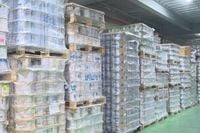On May 6, 2025, the Chairman of the Hanoi People's Committee, Tran Sy Thanh, signed and issued Official Dispatch No. 1802/UBND-KGVX aimed at intensifying the coordination and strict handling of organizations and individuals involved in the production and trading of fake medicines, fake milk, and fake health protection foods. This decisive action comes in response to the growing concerns over the prevalence of counterfeit products that threaten public health and safety.
The Hanoi People's Committee has mandated the City Police to urgently investigate cases that have already been detected and handled in accordance with their authority and legal provisions. The Committee has also called for the organization of specialized investigations to uncover and rigorously address violations concerning the production and trading of these harmful products within the city.
In a concerted effort to combat this issue, the Hanoi Department of Health has been tasked with leading a comprehensive review and inspection of compliance with legal regulations surrounding the production, business, and trading of medicines. This includes taking strict action against any violations found during the inspections.
To further bolster these efforts, the Department of Health will advise the City People's Committee to establish two inter-sectoral inspection teams. These teams will focus on inspecting establishments involved in the production, trading, and dealing of functional foods, milk, and nutritional products throughout the city.
The Department of Industry and Trade, acting as the Standing Agency of the City Steering Committee 389, will also lead an inter-sectoral inspection team to examine compliance with food safety regulations among establishments dealing with functional foods, milk, and nutritional products. They are expected to report their findings back to the City People's Committee as required.
In addition, the Hanoi Department of Culture and Sports will collaborate with the Department of Health, the Department of Industry and Trade, and the City Police to review and address violations related to advertising practices across various media platforms. This includes scrutinizing advertisements that promote fake medicines, fake milk, and counterfeit health protection foods.
The Chairman of the Hanoi People's Committee has also urged local district and town authorities to enhance public awareness regarding compliance with food safety policies and laws. This initiative aims to ensure that both organizations and individuals involved in food production and trade within their jurisdictions adhere to safety regulations.
To this end, a peak period of general review and inspection will be organized, focusing on compliance with pharmaceutical and food safety laws for establishments trading in medicines, milk, and health protection foods. This initiative is crucial for promptly identifying and addressing violations.
From May 9, 2025, until June 15, 2025, inspection teams from Hanoi will conduct surprise inspections of the production and business practices related to milk, nutritional foods, supplementary foods, and health protection foods in 30 districts, towns, and cities. This proactive approach is part of the broader strategy to tackle the growing issue of counterfeit products.
The establishment of these inter-sectoral inspection teams is formalized under Decision No. 2312/QD-UBND, which outlines their roles and responsibilities in ensuring food safety across the city. The first inspection team will be led by Vu Cao Cuong, the Deputy Director of the Hanoi Department of Health, with Dang Thanh Phong, the head of the Hanoi Food Safety Sub-Department, serving as the deputy leader. The second team will be headed by Nguyen Dinh Thang, the Deputy Director of the Department of Industry and Trade.
These teams will focus on implementing food safety regulations effectively, ensuring that their inspections are targeted and impactful. They will also verify the execution of tasks and powers as stipulated in Clause 2, Article 70 of the Food Safety Law. Any violations identified during these inspections will be addressed, and recommendations for further action will be made as necessary.
Hanoi's decisive action comes amid a troubling trend where counterfeit food products, medicines, and health supplements have been increasingly prevalent in Vietnam. These counterfeit items are often produced with sophistication, making them difficult to distinguish from genuine products. They are primarily sold through retail channels, social media, and e-commerce platforms.
In recent months, there have been numerous high-profile cases involving the production and sale of counterfeit products, including fake milk, fake medicines, and health supplements. Such cases have raised significant public concern, prompting law enforcement to take action. For instance, large-scale operations have been uncovered, revealing extensive networks engaged in the distribution of these fraudulent goods.
The Hanoi government's initiative to establish surprise inspections for the production and business of milk and health products aligns with Official Telegram No. 55/CD-TTg issued by the Prime Minister on May 2, 2025. This official directive emphasizes the need for collaboration and stringent measures against organizations and individuals involved in the production and trading of counterfeit products.
As the situation evolves, the Hanoi People's Committee remains committed to ensuring public safety by rigorously enforcing regulations and conducting thorough inspections. The collective efforts of various city departments, law enforcement, and local governments signify a strong stance against the production and distribution of counterfeit goods.
By prioritizing food safety and public health, the Hanoi authorities aim to restore consumer confidence and protect the citizens from the dangers posed by counterfeit medicines, milk, and health protection foods. This comprehensive approach is essential for safeguarding the well-being of the community and ensuring that the market remains free from fraudulent products.

